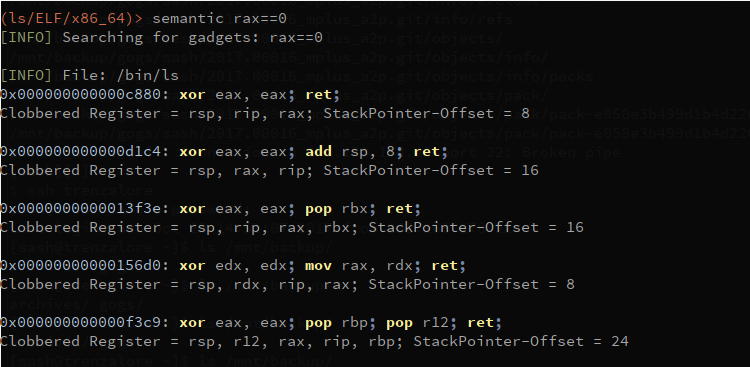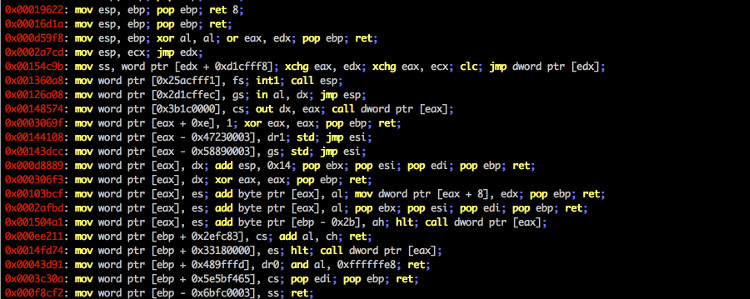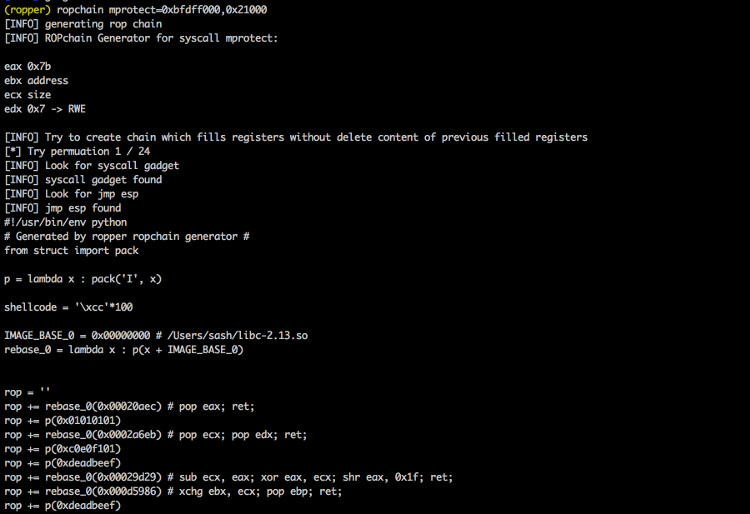Tree @master (Download .tar.gz)
Ropper
You can use ropper to display information about binary files in different file formats and you can search for gadgets to build rop chains for different architectures (x86/X86_64, ARM/ARM64, MIPS/MIPS64, PowerPC/PowerPC64, SPARC64). For disassembly ropper uses the awesome Capstone Framework.
Install
Install Capstone with PyPi:
$ sudo pip install capstone
Install filebytes with PyPi:
$ sudo pip install filebytes
Optional (not needed to run ropper just to look for gadgets):
Install Keystone:
$ sudo pip install keystone-engine
Install and execute Ropper
$ python setup.py install
$ ropper
You can also install Ropper with pip
$ pip install ropper
If you want, you can use Ropper without installation
$ ./Ropper.py
If you don't want to install filebytes, filebytes is a submodule of the ropper repository. This means you don't need to install filebytes and ropper.
$ git clone https://github.com/sashs/ropper.git
$ cd ropper
$ git submodule init
$ git submodule update
$ ./Ropper.py
THIS FEATURE IS STILL UNDER DEVELOPEMENT! Ropper has a semantic search command, which offers the possiblity to search for gadgets.
$ ropper --file <afile> --semantic "<any constraint>"
The following optional dependencies are needed to use semantic search:
Install pyvex
$ sudo pip install pyvex
Install z3py
$ python scripts/mk_make.py
$ cd build
$ make
$ sudo make install
Currently Possible Constraints
reg == reg - assign register to another
reg == number - assign number to register
reg == [reg] - assign memory to register
reg += number/reg/[reg]
reg -= number/reg/[reg]
reg *= number/reg/[reg]
reg /= number/reg/[reg]
Constraint Example
eax==1 !ebx - set eax to 1 and look for gadgets which does not clobber ebx

Usage
usage: Ropper.py [-h] [-v] [--console] [-f <file>] [-r] [-a <arch>]
[--section <section>] [--string [<string>]] [--hex]
[--asm <asm> [H|S|R] [<asm> [H|S|R] ...]] [--disasm <opcode>]
[--disassemble-address <address:length>] [-i] [-e]
[--imagebase] [-c] [-s] [-S] [--imports] [--symbols]
[--set <option>] [--unset <option>] [-I <imagebase>] [-p]
[-j <reg>] [--stack-pivot] [--inst-count <n bytes>]
[--search <regex>] [--quality <quality>] [--opcode <opcode>]
[--instructions <instructions>] [--type <type>] [--detailed]
[--all] [--cfg-only] [--chain <generator>] [-b <badbytes>]
[--nocolor] [--clear-cache]
You can use ropper to display information about binary files in different file formats
and you can search for gadgets to build rop chains for different architectures
supported filetypes:
ELF
PE
Mach-O
Raw
supported architectures:
x86 [x86]
x86_64 [x86_64]
MIPS [MIPS, MIPS64]
ARM/Thumb [ARM, ARMTHUMB]
ARM64 [ARM64]
PowerPC [PPC, PPC64]
SPARC [SPARC64]
available rop chain generators:
execve (execve[=<cmd>], default /bin/sh) [Linux x86, x86_64]
mprotect (mprotect=<address>:<size>) [Linux x86, x86_64]
virtualprotect (virtualprotect=<address iat vp>:<size>) [Windows x86]
optional arguments:
-h, --help show this help message and exit
-v, --version Print version
--console Starts interactive commandline
-f <file>, --file <file>
The file to load
-r, --raw Loads the file as raw file
-a <arch>, --arch <arch>
The architecture of the loaded file
--section <section> The data of the this section should be printed
--string [<string>] Looks for the string <string> in all data sections
--hex Prints the selected sections in a hex format
--asm <asm> [H|S|R] [<asm> [H|S|R] ...]
A string to assemble and a format of the output
(H=HEX, S=STRING, R=RAW, default: H)
--disasm <opcode> Opcode to disassemble (e.g. ffe4, 89c8c3, ...)
--disassemble-address <address:length>
Disassembles instruction at address <address>
(0x12345678:L3). The count of instructions to
disassemble can be specified (0x....:L...)
-i, --info Shows file header [ELF/PE/Mach-O]
-e Shows EntryPoint
--imagebase Shows ImageBase [ELF/PE/Mach-O]
-c, --dllcharacteristics
Shows DllCharacteristics [PE]
-s, --sections Shows file sections [ELF/PE/Mach-O]
-S, --segments Shows file segments [ELF/Mach-O]
--imports Shows imports [ELF/PE]
--symbols Shows symbols [ELF]
--set <option> Sets options. Available options: aslr nx
--unset <option> Unsets options. Available options: aslr nx
-I <imagebase> Uses this imagebase for gadgets
-p, --ppr Searches for 'pop reg; pop reg; ret' instructions
[only x86/x86_64]
-j <reg>, --jmp <reg>
Searches for 'jmp reg' instructions (-j reg[,reg...])
[only x86/x86_64]
--stack-pivot Prints all stack pivot gadgets
--inst-count <n bytes>
Specifies the max count of instructions in a gadget
(default: 6)
--search <regex> Searches for gadgets
--quality <quality> The quality for gadgets which are found by search (1 =
best)
--opcode <opcode> Searches for opcodes (e.g. ffe4 or ffe? or ff??)
--instructions <instructions>
Searches for instructions (e.g. "jmp esp", "pop eax;
ret")
--type <type> Sets the type of gadgets [rop, jop, sys, all]
(default: all)
--detailed Prints gadgets more detailed
--all Does not remove duplicate gadgets
--cfg-only Filters out gadgets which fail the Microsoft CFG
check. Only for PE files which are compiled with CFG
check enabled (check DllCharachteristics) [PE]
--chain <generator> Generates a ropchain [generator parameter=value[
parameter=value]]
-b <badbytes>, --badbytes <badbytes>
Set bytes which should not contains in gadgets
--nocolor Disables colored output
--clear-cache Clears the cache
example uses:
[Generic]
./Ropper.py
./Ropper.py --file /bin/ls --console
[Informations]
./Ropper.py --file /bin/ls --info
./Ropper.py --file /bin/ls --imports
./Ropper.py --file /bin/ls --sections
./Ropper.py --file /bin/ls --segments
./Ropper.py --file /bin/ls --set nx
./Ropper.py --file /bin/ls --unset nx
./Ropper.py --file /bin/ls --inst-count 5
./Ropper.py --file /bin/ls --search "sub eax" --badbytes 000a0d
./Ropper.py --file /bin/ls --search "sub eax" --detail
./Ropper.py --file /bin/ls --filter "sub eax"
./Ropper.py --file /bin/ls --inst-count 5 --filter "sub eax"
./Ropper.py --file /bin/ls --opcode ffe4
./Ropper.py --file /bin/ls --opcode ffe?
./Ropper.py --file /bin/ls --opcode ??e4
./Ropper.py --file /bin/ls --detailed
./Ropper.py --file /bin/ls --ppr --nocolor
./Ropper.py --file /bin/ls --jmp esp,eax
./Ropper.py --file /bin/ls --type jop
./Ropper.py --file /bin/ls --chain execve
./Ropper.py --file /bin/ls --chain "execve cmd=/bin/sh" --badbytes 000a0d
./Ropper.py --file /bin/ls --chain "mprotect address=0xbfdff000 size=0x21000"
./Ropper.py --file /bin/ls /lib/libc.so.6 --console
[Assemble/Disassemble]
./Ropper.py --asm "jmp esp"
./Ropper.py --asm "mov eax, ecx; ret"
./Ropper.py --disasm ffe4
[Search]
./Ropper.py --file /bin/ls --search <searchstring>
? any character
% any string
Example:
./Ropper.py --file /bin/ls --search "mov e?x"
0x000067f1: mov edx, dword ptr [ebp + 0x14]; mov dword ptr [esp], edx; call eax
0x00006d03: mov eax, esi; pop ebx; pop esi; pop edi; pop ebp; ret ;
0x00006d6f: mov ebx, esi; mov esi, dword ptr [esp + 0x18]; add esp, 0x1c; ret ;
0x000076f8: mov eax, dword ptr [eax]; mov byte ptr [eax + edx], 0; add esp, 0x18; pop ebx; ret ;
./Ropper.py --file /bin/ls --search "mov [%], edx"
0x000067ed: mov dword ptr [esp + 4], edx; mov edx, dword ptr [ebp + 0x14]; mov dword ptr [esp], edx; call eax;
0x00006f4e: mov dword ptr [ecx + 0x14], edx; add esp, 0x2c; pop ebx; pop esi; pop edi; pop ebp; ret ;
0x000084b8: mov dword ptr [eax], edx; ret ;
0x00008d9b: mov dword ptr [eax], edx; add esp, 0x18; pop ebx; ret ;
./Ropper.py --file /bin/ls --search "mov [%], edx" --quality 1
0x000084b8: mov dword ptr [eax], edx; ret ;; ret ;
Use ropper in Scripts
#!/usr/bin/env python
from ropper import RopperService
# not all options need to be given
options = {'color' : False, # if gadgets are printed, use colored output: default: False
'badbytes': '00', # bad bytes which should not be in addresses or ropchains; default: ''
'all' : False, # Show all gadgets, this means to not remove double gadgets; default: False
'inst_count' : 6, # Number of instructions in a gadget; default: 6
'type' : 'all', # rop, jop, sys, all; default: all
'detailed' : False} # if gadgets are printed, use detailed output; default: False
rs = RopperService(options)
##### change options ######
rs.options.color = True
rs.options.badbytes = '00'
rs.options.badbytes = ''
rs.options.all = True
##### open binaries ######
# it is possible to open multiple files
rs.addFile('test-binaries/ls-x86')
rs.addFile('ls', bytes=open('test-binaries/ls-x86','rb').read()) # other possiblity
rs.addFile('ls_raw', bytes=open('test-binaries/ls-x86','rb').read(), raw=True, arch='x86')
##### close binaries ######
rs.removeFile('ls')
rs.removeFile('ls_raw')
# Set architecture of a binary, so it is possible to look for gadgets for a different architecture
# It is useful for ARM if you want to look for ARM gadgets or Thumb gadgets
# Or if you opened a raw file
ls = 'test-binaries/ls-x86'
rs.setArchitectureFor(name=ls, arch='x86')
rs.setArchitectureFor(name=ls, arch='x86_64')
rs.setArchitectureFor(name=ls, arch='ARM')
rs.setArchitectureFor(name=ls, arch='ARMTHUMB')
rs.setArchitectureFor(name=ls, arch='ARM64')
rs.setArchitectureFor(name=ls, arch='MIPS')
rs.setArchitectureFor(name=ls, arch='MIPS64')
rs.setArchitectureFor(name=ls, arch='PPC')
rs.setArchitectureFor(name=ls, arch='PPC64')
rs.setArchitectureFor(name=ls, arch='SPARC64')
rs.setArchitectureFor(name=ls, arch='x86')
##### load gadgets ######
# load gadgets for all opened files
rs.loadGadgetsFor()
# load gadgets for only one opened file
ls = 'test-binaries/ls-x86'
rs.loadGadgetsFor(name=ls)
# change gadget type
rs.options.type = 'jop'
rs.loadGadgetsFor()
rs.options.type = 'rop'
rs.loadGadgetsFor()
# change instruction count
rs.options.inst_count = 10
rs.loadGadgetsFor()
##### print gadgets #######
rs.printGadgetsFor() # print all gadgets
rs.printGadgetsFor(name=ls)
##### Get gadgets ######
gadgets = rs.getFileFor(name=ls).gadgets
##### search pop pop ret ######
pprs = rs.searchPopPopRet(name=ls) # looks for ppr only in 'test-binaries/ls-x86'
pprs = rs.searchPopPopRet() # looks for ppr in all opened files
for file, ppr in pprs.items():
for p in ppr:
print p
##### load jmp reg ######
jmp_regs = rs.searchJmpReg(name=ls, regs=['esp', 'eax']) # looks for jmp reg only in 'test-binaries/ls-x86'
jmp_regs = rs.searchJmpReg(regs=['esp', 'eax'])
jmp_regs = rs.searchJmpReg() # looks for jmp esp in all opened files
for file, jmp_reg in jmp_regs.items():
for j in jmp_reg:
print j
##### search opcode ######
ls = 'test-binaries/ls-x86'
gadgets_dict = rs.searchOpcode(opcode='ffe4', name=ls)
gadgets_dict = rs.searchOpcode(opcode='ffe?')
gadgets_dict = rs.searchOpcode(opcode='??e4')
for file, gadgets in gadgets_dict.items():
for g in gadgets:
print g
##### search instructions ######
ls = 'test-binaries/ls-x86'
for file, gadget in rs.search(search='mov e?x', name=ls):
print file, gadget
for file, gadget in rs.search(search='mov [e?x%]'):
print file, gadget
result_dict = rs.searchdict(search='mov eax')
for file, gadgets in result_dict.items():
print file
for gadget in gadgets:
print gadget
##### assemble instructions ######
hex_string = rs.asm('jmp esp')
print '"jmp esp" assembled to hex string =', hex_string
raw_bytes = rs.asm('jmp esp', format='raw')
print '"jmp esp" assembled to raw bytes =', raw_bytes
string = rs.asm('jmp esp', format='string')
print '"jmp esp" assembled to string =',string
arm_bytes = rs.asm('bx sp', arch='ARM')
print '"bx sp" assembled to hex string =', arm_bytes
##### disassemble bytes #######
arm_instructions = rs.disasm(arm_bytes, arch='ARM')
print arm_bytes, 'disassembled to "%s"' % arm_instructions
# Change the imagebase, this also change the imagebase for all loaded gadgets of this binary
rs.setImageBaseFor(name=ls, imagebase=0x0)
# reset image base
rs.setImageBaseFor(name=ls, imagebase=None)
gadgets = rs.getFileFor(name=ls).gadgets
# gadget address
print hex(gadgets[0].address)
# get instruction bytes of gadget
print bytes(gadgets[0].bytes).encode('hex')
# remove all gadgets containing bad bytes in address
rs.options.badbytes = '000a0d' # gadgets are filtered automatically
Project page
http://scoding.de/ropper
Screenshots







Commit History @master
- Refresh Debian files Steev Klimaszewski 1 year, 5 months ago
- New upstream release Steev Klimaszewski 1 year, 5 months ago
- New upstream version 1.13.8 Steev Klimaszewski 1 year, 5 months ago
- Remove template comment and switch spaces to tabs Ben Wilson 2 years ago
- Consistency with tabs to spaces Ben Wilson 2 years ago
- Update email address Ben Wilson 2 years ago
- Update standards version to 4.5.0, no changes needed. Kali Janitor 3 years ago
- Set upstream metadata fields: Bug-Database, Bug-Submit, Repository, Repository-Browse. Kali Janitor 3 years ago
- Add missing depends: python3-pkg-resources Sophie Brun 3 years ago
- Update debian/changelog Sophie Brun 4 years ago